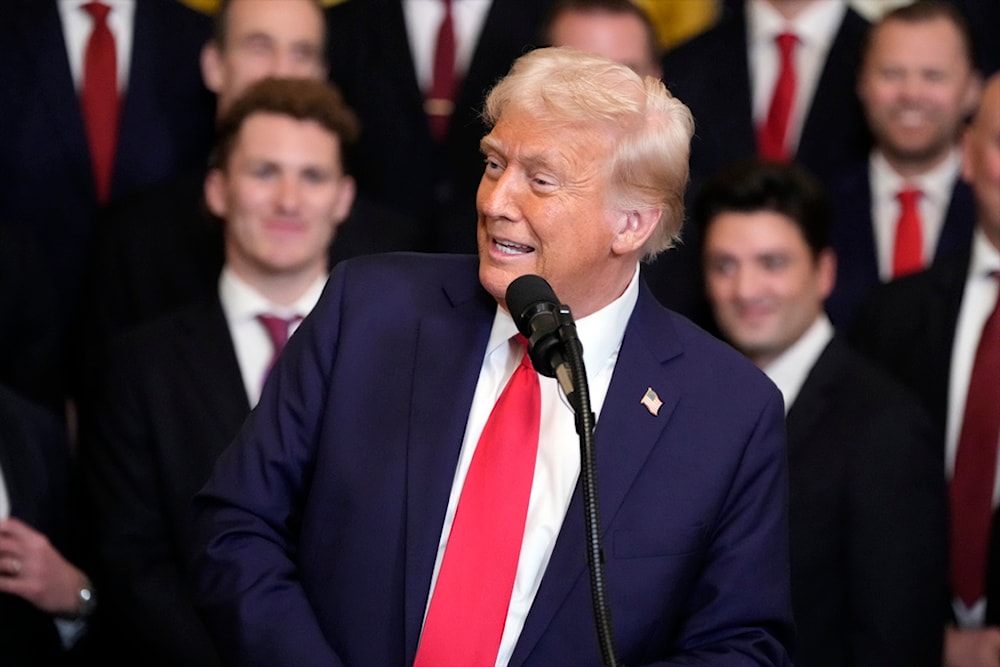Trump shelves 'Israel' plans to attack Iran, Maariv reports
US President Donald Trump reportedly shot down Israeli plans to launch an attack on Iran as the Israeli regime seeks to attack the country.
-

President Donald Trump speaks during a ceremony with the Florida Panthers NHL hockey team in the East Room of the White House, Monday, Feb. 3, 2025, in Washington (AP)
Israeli Prime Minister Benjamin Netanyahu is set to meet US President Donald Trump at the White House on Tuesday evening. Ahead of this high-profile meeting, Netanyahu held discussions in Washington with US National Security Advisor Mike Waltz and businessman Steve Witkoff. The Israeli Prime Minister’s Office described the talks as “positive and friendly” and announced plans to send a professional delegation to Doha next weekend to discuss the technical aspects of an ongoing agreement.
Following his return to the occupied Palestinian territories, Netanyahu is expected to convene a cabinet meeting to formulate the Israeli occupation's position on the second phase of the deal, Maariv reported.
According to a senior Israeli official speaking to The Washington Post, Netanyahu seeks a new framework or guarantees from Trump, particularly ensuring that Hamas would not be part of Gaza’s future governance. The report also highlighted uncertainty regarding an agreement on handling Iran, noting that “there is no longer talk of attacking Iran.”
Shortly after Iran’s missile attack in October, the Israeli regime had prepared plans for a potential joint strike on Iran’s nuclear facilities. However, the focus now appears to have shifted toward "diplomatic solutions". The US administration is currently prioritizing ending the fighting in Gaza.
A senior official stated, “Trump is interested in Gaza’s reconstruction through a regional agreement with the UAE and Saudi Arabia.” The official also noted Netanyahu’s alignment with Trump’s position, emphasizing the close partnership between the two leaders.
Trump determined to change global dynamics
Brigadier General (Res.) Udi Dekel, a co-founder of the Alliance for Regional Security, told the Israeli 103FM radio station that Trump entered the White House determined to change global dynamics. However, regarding Iran, “Trump wants to return to a nuclear deal—albeit an improved one—that would prevent Iran from obtaining a nuclear bomb.” He is also advancing a trillion-dollar agreement with Saudi Arabia to reshape the Middle East’s balance of power.
Dekel explained that Saudi Arabia is now more willing to advance normalization with the Israeli occupation as part of a broader strategy to contain and isolate Iran, especially given Tehran’s weakened position following recent conflicts.
While acknowledging uncertainty about Netanyahu’s exact strategy, Dekel suggested that the current diplomatic push extends beyond the prisoner swap agreement. “The next phase is expected to halt fighting in Gaza and pursue a political solution—something Israel has so far avoided,” he said. He linked this development directly to the Saudi normalization process, noting that progress on that front is unlikely while the Gaza conflict continues and a long-term resolution for the Strip remains unclear.
The American vision, Dekel added, does not rely on the Palestinian Authority. “They never fought terrorism for us, and they never will,” he said, adding that the central question remains: Who will govern Gaza, and who will oversee humanitarian aid?
According to Dekel, Trump is challenging Arab states: “Either take an active role in solving the Gaza problem, or I will act differently.” He is pushing for a clear stance and an end to neutrality, aiming to establish a new regional framework where Arab nations play a central role in containing and de-escalating the Palestinian resistance.
Postponing second phase of talks
Netanyahu is reportedly seeking to gain Trump's support for his plans concerning the Gaza Strip during an upcoming meeting in Washington, Axios reported on Sunday.
The meeting could have significant consequences for the ceasefire in Gaza, with Netanyahu eager to understand Trump’s stance on the second phase of the ceasefire deal. This phase may involve a permanent ceasefire and the complete withdrawal of Israeli forces from Gaza.
Before proceeding with any decisions, Netanyahu intends to gauge Trump’s position on the deal. The start of negotiations with Hamas, initially scheduled for Monday, may be postponed, as Netanyahu has chosen to first consult with Trump, according to unnamed Israeli officials.
If Netanyahu opts not to pursue the second phase, the conflict in Gaza could continue for "up to another year" as the Israeli occupation "seeks to completely dismantle Hamas," officials said.

 4 Min Read
4 Min Read










